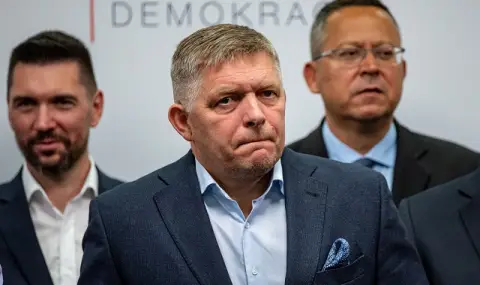Misinformation and insinuations flooded social media after the assassination attempt of Slovak Prime Minister Robert Fico. Disinformation narratives are basically three-pronged. Mina Kirkova explains:
On Wednesday, Slovak Prime Minister Robert Fico was shot dead in the town of Handlova, about 150 kilometers from the capital Bratislava. Fico, who underwent a long operation, was in danger for hours. And today he is still in critical condition, according to the authorities in Slovakia.
In the hours after the attempted assassination of the Slovak Prime Minister, the information began to be used in a twisted context. "Already in the first minutes, after the news of the assassination attempt appeared in the local and then in the world agencies, disinformation narratives, united mainly around three themes, began to spread: the opposition, the media in the country and Fico's anti-globalist positions". says Ruslan Trad, a security research expert at the Atlantic Council's Digital Investigations Laboratory.
Claim: Part of a NATO operation?
Public figures and commentators across Europe began to speculate on the motives behind the assassination attempt. In publications on social networks in Bulgaria, there were even comments defining the assassination attempt as "Euro-Atlantic terror", and political figures provocatively asked in their online profiles "who is interested in the death of the Slovak politician". and "who will be next".
Fico's position on the war in Ukraine was also immediately used to spread misinformation. "Officials connected to the Russian government were quick to insert an alleged Ukrainian connection around the attacker," Ruslan Trad explains. "On the other hand, the Russian channels in Telegram accuse Great Britain of organizing the assassination attempt."
Accusations are also directed at NATO - for example to Russian state channels such as "Sputnik", where former US military Scott Bennett said the assassination attempt could be "part of NATO operations targeting leaders who oppose of the war in Ukraine". He even drew an analogy with the assassination of US President John F. Kennedy. Scott Bennett is a figure that the pro-Kremlin media often uses for analysis, where he is presented as a "Western expert". In 2011, he was sentenced by a US court to three years in prison on charges of illegal possession of a large number of weapons, illegally impersonating a police representative and spreading false information about the US military. Clips of Scott Bennett's speeches before Russian media are actively distributed in Bulgaria as well.
In his profile on the social network X, the popular influencer who is accused of human trafficking, organizing a criminal group and rape, Andrew Tate indirectly also blamed the West for the assassination of the Slovak prime minister. He wrote that "the enemies of the truth no longer hide their intentions", explaining that Fico is against measures to protect against Covid-19, the WHO and to end the war in Ukraine (with negotiations and ceding territories to Russia, white .line).
Who is spreading the disinformation?
"The activity of Russian channels, pro-government journalists and officials using social networks to promote strongholds is visible," says Ruslan Trad. The division in Slovakia, which was observed even before the assassination attempt on the prime minister, is clearly visible even now, the expert also commented. "Although some of Fico's ministers have tried to send a message of unity and coolness, this has not had much effect so far."
Slovak Interior Minister Matusz Estok Sutai accused "hate speech" about the attack on Fico and called "to respond to hate with hate". According to Ruslan Trad, the liberal opposition cannot accept such attacks, "given that Fico's entire campaign is based on direct attacks on opponents". Representatives of Slovakia's nationalist parties blamed pro-Western media that criticize the government. The chairman of the Slovak National Party, which is part of the ruling coalition, threatened to "start a political war". At the same time, attacks against journalists from independent media in the country also appeared in pro-government Hungarian media.
What is known about the perpetrator?
The Slovak interior minister confirmed the identity of the attacker, who was arrested at the scene. Only a few hours after Fizo was taken to the hospital with gunshot wounds, information about the perpetrator began to appear on social networks. Named was 71-year-old Juraj Tsintula, who was described in various publications on Bulgarian social networks as a "psycho-rightist liberal" and "activist of the opposition Progressive Slovakia".
"He is known to have contradictory positions," explains Ruslan Trad. "Former security guard with a personal weapon for which he has a permit. One of his books is racist and directed against the Roma in Slovakia. His participation in circles surrounding the pro-Russian paramilitary organization "Slovak Guards" has also been confirmed. and at least until 2016 there are joint photos with members of the formation. It is also known that he openly criticized Fico", the expert also says.
